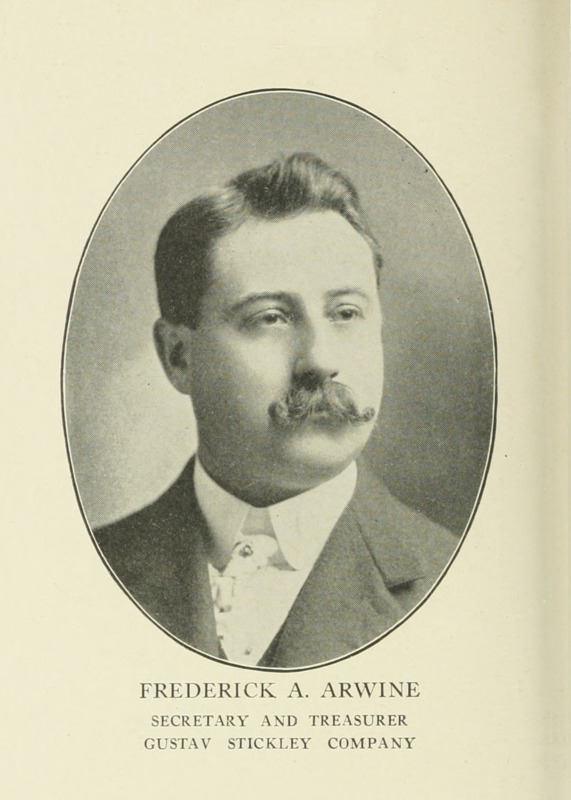Frederick Allen Arwine
Item
Title
Frederick Allen Arwine
Date
Aug 20, 1872 to May 13, 1946
Description
Frederick Allen Arwine’s career with Gustav Stickley illustrates the type of upward mobility associated with the American dream that is often spoken of, but seldom realized. After a few years as the firm’s bookkeeper from as early as 1898 to 1900, he was promoted to General Manager by the end of January 1901. According to the press at the time of his promotion, Arwine was earning $2000 a year, or about double the amount of a skilled craftsman working in the factory. By 1903, he began listing himself as “foreman” in the Syracuse City Directories, but whether this was a change in duties or name only is unknown.
According to the company records preserved at Winterthur, Arwine resigned on January 2, 1905 to focus his attention on the Lee-Arwine Company, a firm incorporated in December 1904. Shortly following the formation of the company, The Syracuse Journal described their purpose: “The company will manufacture a line of family supplies and carry a line of general merchandise as premiums.” The firm must have been short-lived for by 1907 had joined former Stickley employees Norman L. and Joseph A. Knaus to form the company of Knaus Brothers & Arwine, a manufacturer of wood and leather goods. Unfortunately, a fire destroyed the firm’s building in Fayetteville in December of 1908, but the firm–who then employed about fifty men–appears to have continued operating.
Arwine moved to New York City in 1911 to work again for Stickley, this time as Treasurer of the Craftsman Shop. Although he left Syracuse with the promise of this new position and an assurance to his wife that he would send for her (and their son), these promises never materialized. “Acting on her suspicions,” according to The Syracuse Herald, Mrs. Della C. Arwine traveled to New York City and upon returning to Syracuse, promptly consulted a lawyer. The divorce was settled in her favor in late May of 1915, which included custody of her son and $10 per week alimony, but her sudden death the following week pushed issues of custodianship and her estate back to the courts.
Arwine’s movement’s following the bankruptcy and reorganization of Stickley’s business have not been examined, but by 1919 he was living in Clyde, New York–about half-way between Syracuse and Rochester–where he owned a farm. He returned to the Stickley operation in July of 1919, when he replaced Charles M. Kessler as General Manager of the L. & J. G. Stickley Furniture Company and was reportedly disposing of his farm in Clyde so he could reside in the village of Fayetteville. According to later reports, Arwine remained with the firm until 1939, serving as Secretary and Treasurer. He devoted his later life to financial and civic matters, serving as Director of the Fayetteville Commercial Bank, and also on the Village Board for a number of years.
According to the company records preserved at Winterthur, Arwine resigned on January 2, 1905 to focus his attention on the Lee-Arwine Company, a firm incorporated in December 1904. Shortly following the formation of the company, The Syracuse Journal described their purpose: “The company will manufacture a line of family supplies and carry a line of general merchandise as premiums.” The firm must have been short-lived for by 1907 had joined former Stickley employees Norman L. and Joseph A. Knaus to form the company of Knaus Brothers & Arwine, a manufacturer of wood and leather goods. Unfortunately, a fire destroyed the firm’s building in Fayetteville in December of 1908, but the firm–who then employed about fifty men–appears to have continued operating.
Arwine moved to New York City in 1911 to work again for Stickley, this time as Treasurer of the Craftsman Shop. Although he left Syracuse with the promise of this new position and an assurance to his wife that he would send for her (and their son), these promises never materialized. “Acting on her suspicions,” according to The Syracuse Herald, Mrs. Della C. Arwine traveled to New York City and upon returning to Syracuse, promptly consulted a lawyer. The divorce was settled in her favor in late May of 1915, which included custody of her son and $10 per week alimony, but her sudden death the following week pushed issues of custodianship and her estate back to the courts.
Arwine’s movement’s following the bankruptcy and reorganization of Stickley’s business have not been examined, but by 1919 he was living in Clyde, New York–about half-way between Syracuse and Rochester–where he owned a farm. He returned to the Stickley operation in July of 1919, when he replaced Charles M. Kessler as General Manager of the L. & J. G. Stickley Furniture Company and was reportedly disposing of his farm in Clyde so he could reside in the village of Fayetteville. According to later reports, Arwine remained with the firm until 1939, serving as Secretary and Treasurer. He devoted his later life to financial and civic matters, serving as Director of the Fayetteville Commercial Bank, and also on the Village Board for a number of years.

